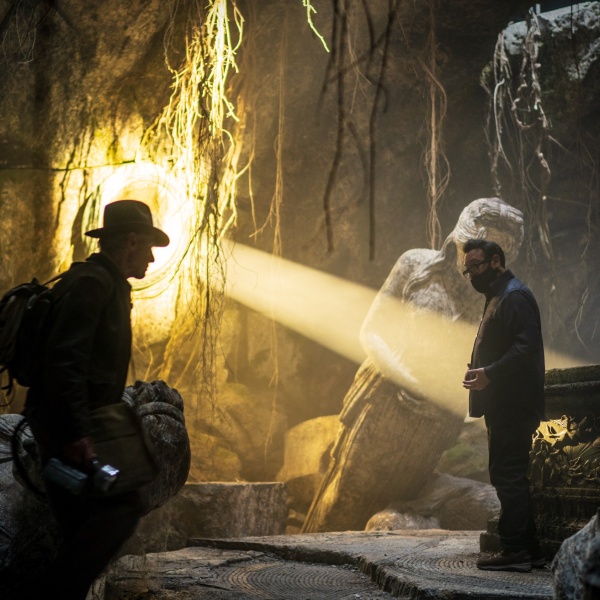[Editor’s note: The following interview contains spoilers for “Back to Black.”]
“Back to Black” is as much an ode to Amy Winehouse as it is to her family, according to actor Eddie Marsan, who portrays the Grammy winner’s father Mitch Winehouse in the Sam Taylor-Johnson film.
The biopic, starring Marisa Abela as Winehouse, has reignited the controversies surrounding the late singer/songwriter, including her drug addiction, codependent marriage, and tumultuous relationship to celebrity.
As Amy (Abela) becomes the most famous woman in England, thanks to her Grammy-winning album “Back to Black,” her career rise is coupled with a personal descent into alcoholism. The film‘s ending, which features a heartbreaking conversation between a newly sober Amy and Mitch (Marsan) in her home mid-renovation, has a poignant gut punch reminder that love really is a losing game.
Amy is harassed by paparazzi outside of her house while escorting her father Mitch; one of the paparazzo yell at Amy that her ex-husband Blake recently fathered a child with his new girlfriend. “Back to Black” implies that it’s at this emotional juncture when Amy decides to relapse; she died in 2011 of alcohol poisoning at age 27. Instead of showing Amy’s final moments, she simply quotes the lyrics to “Tears Dry on Their Own” and ascends the stairs of her house. A title card informs audiences of her death, with a live recording of the ballad playing before the credits.
“It was very, very emotional filming that scene,” Marsan told IndieWire of saying goodbye to Amy. “I thought it was beautifully done and it was actually very accurate. She did die suddenly. She died unexpectedly. It’s not like everybody could see it coming. She was the healthiest when she died. And that’s why the film celebrates her in that way.”
Marsan added, “Mitch showed me a picture of Amy two weeks before she died and she was very healthy, had put on a lot of weight. She was suntanned, she looked really healthy, and she hadn’t actually taken drugs for two or three years. Her heart was damaged [from] being a bulimic from 15. She didn’t die because of drugs, she died because of long-standing abuse over many, many years. So this narrative that she died this broken woman, that she died drug-addled, it’s not true.”

Marsan is also trying to combat other narratives surrounding Amy and the Winehouse family as a whole. While the film does include two scenes in which former aspiring jazz singer Mitch gives advice about Amy’s career, one particular sequence shows Marsan as Mitch telling Amy she shouldn’t go to rehab. Of course, that became the chorus for her aptly-titled Grammy-winning track years later.
But pinning Amy’s addiction itself on those surrounding her, particularly her father and her then-husband, does a disservice to Amy’s memory, according to Marsan.
“I think the reason why people want to blame Blake and Mitch is because it’s a reassuring narrative. Because you can say, ‘Well, if I don’t behave like Mitch and if I don’t behave like Blake, then this is not going to happen to me,’ but the world doesn’t work like that,” Marsan said. “Addiction doesn’t work like that. Addiction is arbitrary and it’s cruel and it can happen to any of us.”
Marsan, who knew Mitch Winehouse through a mutual friend before being cast in “Back to Black,” befriended Amy’s father in the process of making the film. In a somewhat meta twist, both Marsan and Mitch are both from the same neighborhood on the East End of London, and both are longtime jazz fans. “It was very easy for me in many ways to play Mitch,” Marsan said. “He’s a friend of mine. I like him.”
The actor noted that Mitch “never had any creative control” over the script or Marsan’s portrayal of him. The film was made with the approval and cooperation of the Winehouse estate.

“We know they’ve got it in for Mitch, they’ve got it in for the family. I think our industry owes them an apology, really, the way they’ve been treated, if I’m honest,” Marsan said of the hounding of the Winehouse family both before and after Amy’s death. “I think we forget that she was somebody’s daughter. Somebody has lost a daughter. The world at the moment then was so keen to blame someone. I spoke to loads of people who deal with addiction and counsel people with addiction and bear in mind, the [Winehouse] family tried to intervene in Amy’s life nine times. All the experts say that blame is not the answer. The villain is addiction. It isn’t the family.”
Even before taking on the role of Mitch, Marsan did some of his own research with his London contacts.
“I had a friend of mine who worked with Amy and Mitch in the music industry, and when I knew that they were thinking of asking me [to play him], I asked a friend of mine his opinion from his firsthand experience of working with Amy and Mitch,” Marsan said. “He said that he liked Mitch, that he was a loving father who was in a very difficult situation because he thought she was a drug addict. But she was also the most famous woman in the world. At that time, she had unlimited resources and money. She was hounded by the paparazzi and every drug dealer in London was trying to give her drugs. And he said that the man was in an impossible situation. And like any father, he did his best to not make mistakes.”
Marsan revealed that Mitch and the Winehouse family were not enthused by the Asif Kapadia-helmed documentary on Amy that preceded “Back to Black,” which is the first narrative portrayal of the late musician.

“[Mitch] didn’t think that the original documentary was a fair portrayal. He thought that it was a bit of a hit on,” Marsan said. “I didn’t want to do the film [‘Back to Black’] if it sanitized Mitch or if it demonized Mitch. And thankfully, the script was the same. There’s a big difference making a documentary; you’re slightly detached from it. If you make a narrative film, you have to understand the people you’re playing. All of us, the writer, the director, every actor involved in this, we met with the people that Amy grew up with. We met with the people Amy worked with. We spoke to people, we did all our research. The documentary wasn’t a fair portrayal because it was not evoking empathy. Once you evoke empathy [like in ‘Back to Black’], you begin to realize that it’s a much more complicated story than just Amy being a victim.”
To celebrate “Back to Black,” Marsan attended a private Winehouse family screening and “paid his respects” to them. “It’s really weird when the world has ownership of someone like Amy because she’s so brilliant, you quite often people forget that she’s somebody’s daughter,” he said. “It was a very bittersweet experience for the family [watching the film]. I spent the night with the family dancing to Amy’s records and celebrating her in a real good East End way. It was wonderful that Amy’s brilliance is celebrated, but you are showing a film about their daughter’s tragedy, which I always kept in mind.”
And Marsan tried to never lose sight of what “Back to Black” really was about, according to the actor. “I think it’s a beautiful tribute to Amy and I’m so proud of the film,” Marsan said. “A friend of mine has been an addict for 30 years. He helps addicts. And he said to me, it’s the best film about addiction he’s ever seen. That’s all I wanted to hear. It was a beautiful film about addiction.”
“Back to Black” is now in theaters.







